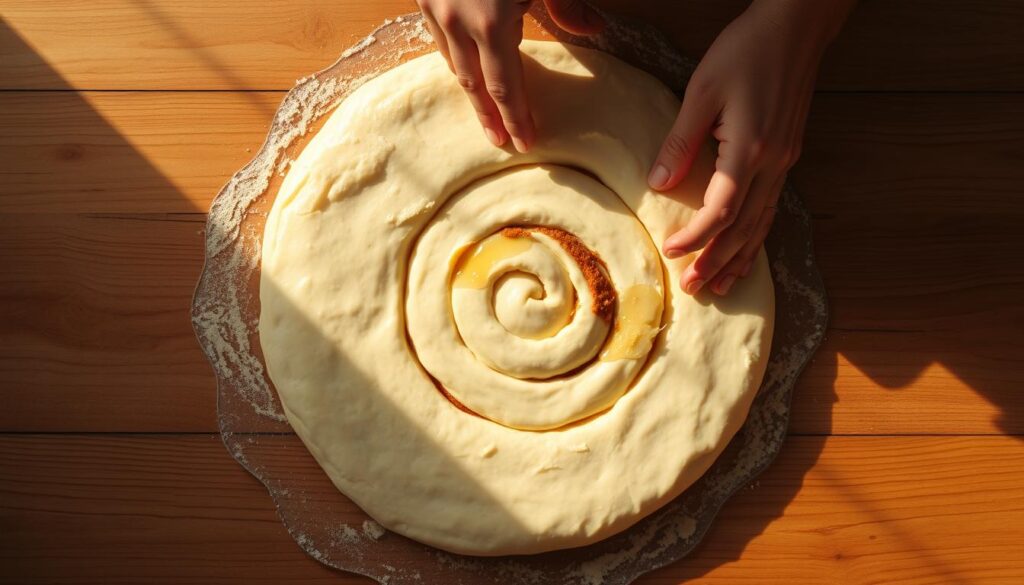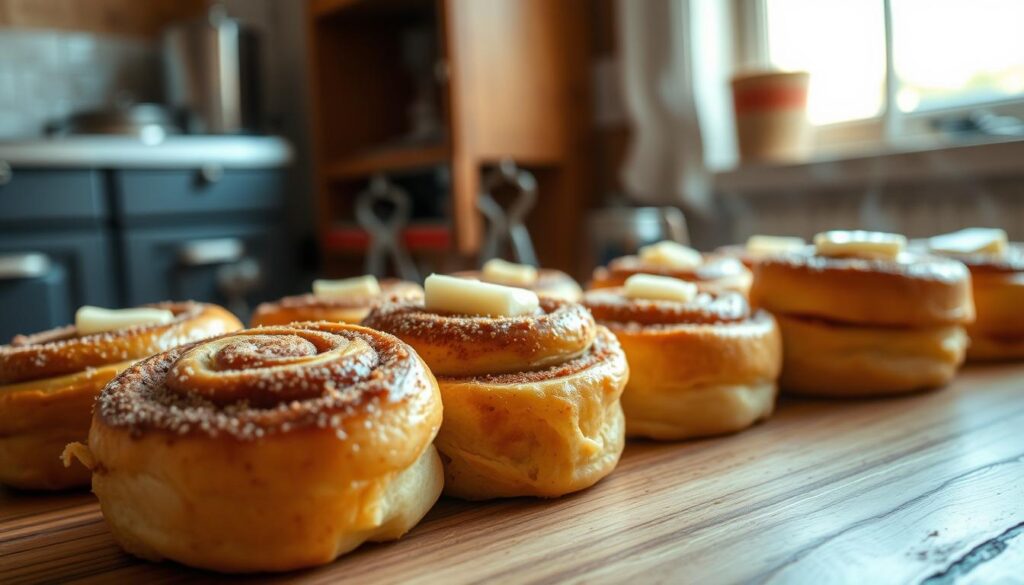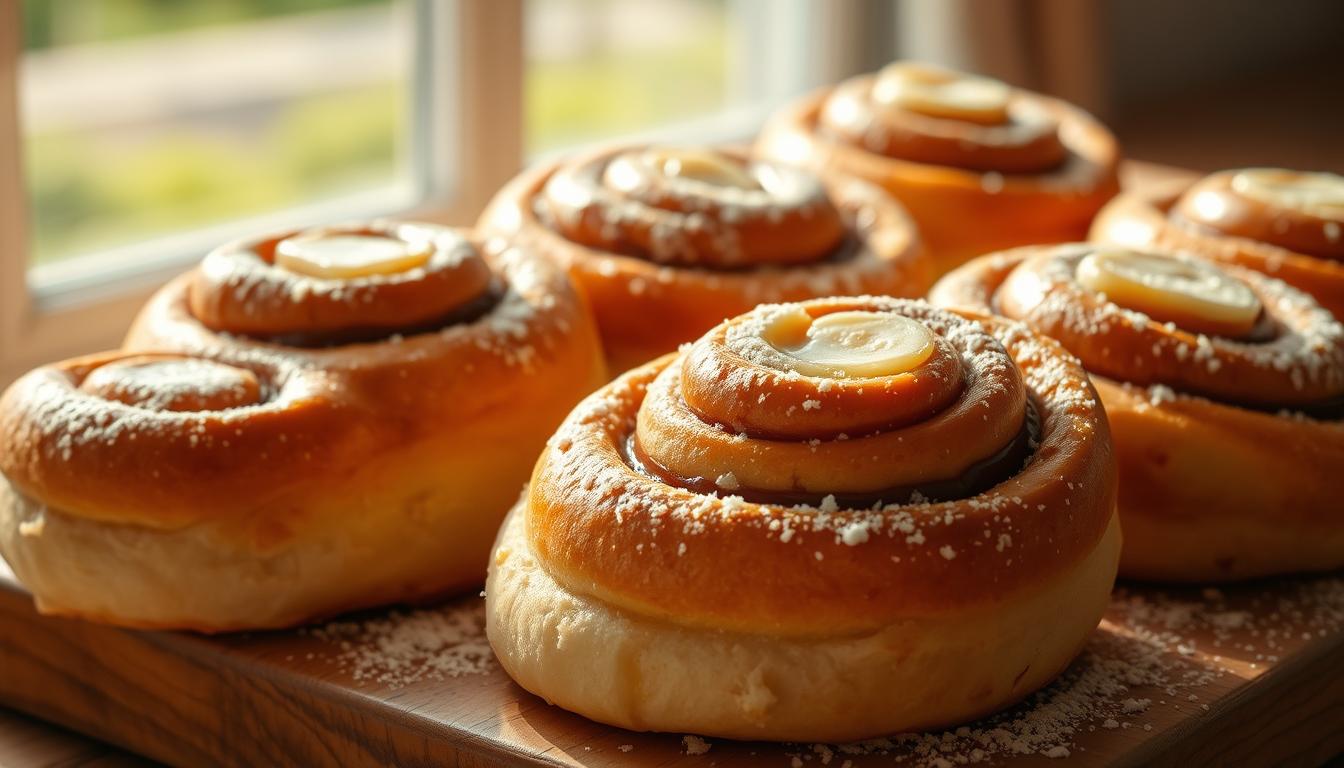The smell of freshly baked cinnamon rolls in your kitchen is a dream for many. Imagine waking up to warm, gooey Overnight Cinnamon Rolls. No need to get up early to mix, knead, and wait.
Our easy cinnamon roll recipe makes your breakfast better. It brings bakery-style results to your kitchen. These sweet spirals of dough and cinnamon make your morning special with little effort.
Whether you’re an experienced baker or new to the kitchen, this recipe is for you. It shows you how to make bakery-quality cinnamon rolls. The secret is an overnight prep that adds amazing flavor and texture.
Table of Contents
The Perfect Overnight Cinnamon Rolls: A Baker’s Introduction
Discover the magic of the best cinnamon roll recipe. It turns your kitchen into a delightful bakery. Make-ahead cinnamon rolls are not just convenient but a culinary art form. They elevate your overnight breakfast recipes to new heights.
Cinnamon rolls have a rich cultural heritage from Sweden. Known as “kanelbulle” in Sweden, these pastries often have a hint of cardamom. This makes them more than just a simple sweet treat.
The Origins of Cinnamon Rolls
The journey of cinnamon rolls started in Scandinavia. Bakers there perfected a technique that spread worldwide. Traditional Swedish bakeries created rolls that are soft, flavorful, and irresistible.
Why Choose Overnight Preparation
- Enhanced flavor development
- Time-saving morning convenience
- More tender and complex taste profile
- Reduced morning preparation stress
The Science Behind Overnight Fermentation
Overnight fermentation is a game-changer for home bakers. It allows the dough to slowly rise in the fridge. This lets yeast work its magic, developing deeper flavors and improving texture.
| Fermentation Factor | Impact on Cinnamon Rolls |
|---|---|
| Slow Rise Temperature | Develops more complex flavor |
| Yeast Activity | Enhances dough structure |
| Gluten Development | Creates softer, more tender rolls |
By understanding these principles, you’ll make your homemade cinnamon rolls extraordinary. They’ll turn a simple breakfast into a memorable culinary experience.
Essential Ingredients for Bakery-Style Success
To make tasty cinnamon rolls from scratch, you need the right ingredients. These ingredients turn simple pastries into something special. Knowing what each part does is key to getting the best taste.
Core Dough Components
Great cinnamon rolls start with top-notch ingredients. Your dough needs:
- All-purpose flour (2¾ cups)
- Instant dried yeast
- Salt
- Whole milk
- Honey
- Unsalted butter
- Large eggs
Filling Ingredients Guide
A great filling makes your dough into something amazing. Your cinnamon roll filling should have:
| Ingredient | Quantity |
|---|---|
| Dark brown sugar | ½ cup |
| Ground cinnamon | 1½ tablespoons |
| Softened butter | 4 tablespoons |
Frosting Elements Explained
The frosting is what makes cinnamon rolls truly special. Choose the best ingredients for your homemade treat:
- Cream cheese
- Powdered sugar
- Vanilla extract
- Soft butter
“The secret to bakery-style cinnamon rolls lies in using fresh, high-quality ingredients and understanding their precise interactions.”
Kitchen Tools and Equipment Needed
To make tasty homemade cinnamon rolls, you need some key kitchen tools. The right equipment makes your easy cinnamon roll recipe a breeze. Let’s look at the essential items for a great baking experience.
Here are the critical tools you’ll need to make bakery-style cinnamon rolls at home:
- Measuring tools:
- Accurate measuring cups (dry and liquid)
- Measuring spoons
- Kitchen scale (optional but recommended)
- Mixing equipment:
- Large mixing bowl
- Stand mixer or hand mixer
- Silicone spatula
- Whisk
- Preparation tools:
- Rolling pin
- Sharp knife or bench scraper
- Parchment paper
- 9×13 inch baking dish
“The right tools can turn a good recipe into an extraordinary baking experience.” – Professional Baker’s Wisdom
Choose tools that are both high-quality and functional. King Arthur All Purpose Flour is a great match for these tools. It helps your homemade cinnamon rolls taste like they came from a bakery.
Pro tip: Get an instant-read thermometer to check milk temperature (around 100° F) for yeast activation. This small tool greatly improves your dough’s rise and success.
Making the Perfect Cinnamon Roll Dough
Creating the best cinnamon roll recipe begins with making the perfect dough. Making cinnamon rolls from scratch needs precision, patience, and knowing key baking techniques. The key to great rolls is in how you mix, knead, and let the dough rise.
Essential Mixing Techniques
When making cinnamon rolls from scratch, mixing ingredients right is key. Follow these steps:
- Combine dry ingredients in a large mixing bowl
- Warm milk and butter to room temperature
- Whisk eggs separately before adding to wet ingredients
- Gradually add wet ingredients to dry mixture
Kneading Methods for Perfect Texture
Kneading makes the dough soft. You have two main ways to knead:
- Hand kneading: Work dough on a floured surface for 8-10 minutes
- Stand mixer method: Use dough hook attachment for 5-7 minutes
First Rise Fundamentals
The first rise is key for flavor and texture. Here’s how to get the perfect rise:
| Aspect | Details |
|---|---|
| Ideal Temperature | 70-80°F (warm, draft-free area) |
| Rising Time | Approximately 1 hour |
| Dough Volume Increase | Should double in size |
| Checking Readiness | Gently press dough – it should slowly spring back |
Professional bakers say patience during the first rise makes great cinnamon rolls even better. Take your time and watch your dough closely for the best results.
Creating the Ultimate Cinnamon Filling
The heart of any great homemade cinnamon rolls is its filling. The quality of your dough is only as good as the filling you put inside. Let’s make the perfect cinnamon filling that will delight your taste buds.
To make an irresistible filling, you’ll need a few key ingredients:
- 1/2 cup (1 stick) unsalted butter, melted
- 3/4 cup packed brown sugar
- 1 tablespoon ground cinnamon
- Optional: chopped nuts or raisins
The secret to a perfect cinnamon filling is finding the right balance. Melt the butter until it’s smooth and slightly cooled. Then, mix in the brown sugar and cinnamon until it’s spreadable. This mix makes each bite of your cinnamon rolls sweet and spicy.
Here are some tips for your filling:
- Use room temperature butter for easier mixing
- Spread the filling evenly for consistent taste
- Leave a small border around the edges to prevent leakage
- Don’t overload – too much filling can cause messy baking
When making your homemade cinnamon rolls, take your time spreading the filling. A smooth, even layer will make your rolls truly spectacular.
Rolling and Shaping Techniques
Learning to roll and shape is key for making tasty homemade cinnamon rolls. Your recipe’s success depends on these techniques. They turn simple ingredients into treats that look and taste like they came from a bakery.

Step-by-Step Rolling Guide
Here’s how to make your cinnamon rolls ahead of time:
- Transfer dough to a floured surface
- Roll into a 22 x 12 inch rectangle
- Use flour to avoid sticking
- Spread filling evenly, leaving edges bare
- Roll from the long edge, making a soft log
Cutting Perfect Portions
For clean cuts, use dental floss. It helps avoid squishing the dough. Cut into 12 equal pieces, each about 3/4 inch thick for the best texture.
Pan Arrangement Tips
Arranging rolls in the pan is important for even baking:
- Place rolls 1-2 inches apart in a greased dish
- Leave space for them to rise
- Ensure even spacing for consistent baking
- Cover loosely with plastic wrap while resting
Your careful rolling and shaping will make your cinnamon rolls look and taste like they’re from a bakery. They’ll impress everyone.
The Overnight Rising Process
Learning the overnight rising process can make your Overnight Cinnamon Rolls truly special. It lets you make your breakfast recipes with little effort in the morning. Plus, it boosts the flavor.
The secret to great overnight cinnamon rolls is slow, cold fermentation. Here’s what you need to know:
- Cover your prepared dough with plastic wrap
- Let the dough rest at room temperature for 1-2 hours
- Refrigerate the dough for 8-24 hours
- Allows deeper flavor development
- Creates a more tender, complex texture
Cold fermentation has many benefits for your breakfast recipes. It lets yeast break down sugars for a richer taste. Your cinnamon rolls will taste better and be softer than quick-rise ones.
Pro Tip: Ensure your dough is in an airtight container to prevent drying out during the overnight rise.
Temperature control is key. Keep your fridge at 36-40°F to slow yeast but not stop it. This way, you can make the dough up to 48 hours ahead.
Baking Your Overnight Cinnamon Rolls
Turning your homemade cinnamon rolls into tasty treats needs care and precision. The baking step is key to making the best cinnamon rolls. They will surely impress your family and friends.

Oven Temperature and Preparation
Heat your oven to 350°F (177°C). This is the perfect temperature for golden cinnamon rolls. A precise temperature ensures even baking and prevents burning or undercooking.
Timing Your Bake
Baking time is usually 25-30 minutes. Watch your rolls closely in the last 10 minutes to avoid over-browning. Here are some timing tips:
- Check rolls at 20 minutes for initial coloration
- Rotate pan halfway through baking for uniform browning
- Look for a deep golden-brown color across the surface
Visual Doneness Indicators
Knowing when your homemade cinnamon rolls are done involves more than timing. Look for these signs:
- Edges should be golden and slightly pulled away from pan sides
- Top surface should be uniform golden-brown
- Rolls should look puffy and slightly expanded
- Center rolls should spring back when gently pressed
Pro tip: If the tops brown too quickly, loosely cover with aluminum foil. This prevents burning while ensuring the centers cook well.
Perfecting the Cream Cheese Frosting
Making the perfect cream cheese frosting turns simple breakfast treats into something special. Your cinnamon rolls need a rich topping that brings all the flavors together. The secret to a great frosting is using the right ingredients and techniques.
First, make sure all your ingredients are at room temperature. You’ll need 8 oz of cream cheese, 4 tablespoons of salted butter, 3.5 cups of powdered sugar, and 1 teaspoon of vanilla extract. These will make a smooth, creamy frosting that makes your homemade breakfast treats even better.
- Beat cream cheese and butter until completely smooth
- Gradually add powdered sugar to prevent lumps
- Mix in vanilla extract for extra flavor
- Adjust consistency with milk if needed
Pro tip: Wait until your cinnamon rolls have cooled for about 5 minutes before applying the frosting. This prevents the frosting from melting and ensures a perfectly spread layer that looks as good as it tastes.
For those wanting to experiment, try these frosting variations:
- Add a splash of coffee for depth
- Sprinkle cinnamon on top
- Incorporate a touch of maple syrup
Your homemade cream cheese frosting will make simple breakfast pastries into a treat that everyone will love.
Serving and Storing Your Homemade Cinnamon Rolls
Your freshly baked homemade cinnamon rolls need special care when serving and storing. Serve them warm, straight from the oven. This way, you get that perfect bakery-style look with the cream cheese glaze.
For make-ahead cinnamon rolls, you have a few storage options:
- Room Temperature Storage: Keep unfrosted rolls at room temperature for up to 2 days in an airtight container
- Refrigeration: Store frosted rolls in the refrigerator for up to 5 days
- Freezing: Freeze unbaked rolls for up to 3 months for long-term preservation
Reheating your homemade cinnamon rolls needs a gentle touch to keep them soft:
- Microwave Method: Warm for 15-20 seconds
- Oven Method: Reheat at 350°F for 5-7 minutes
“Nothing beats the aroma of freshly warmed cinnamon rolls!” – Home Baking Enthuasiast
Freezing tip: Freeze the rolls individually on a baking sheet. Then, put them in a resealable freezer bag. To enjoy, thaw in the fridge for 12-24 hours. Let them come to room temperature before serving.
Variations and Customizations for Your Cinnamon Rolls
Turn your easy cinnamon roll recipe into a fun adventure with exciting flavors. Try adding Nutella for a chocolate twist or blueberries for a fruity surprise. Your breakfast pastries can be a canvas for your creativity.
Seasonal changes can make your cinnamon rolls even better. In autumn, try a pumpkin spice filling. Summer is perfect for lemon-blueberry. Peach and apple add a fruity twist to the classic cinnamon taste.
If you follow a special diet, you can adjust the recipe. Vegans can use plant-based butter and cream. Add walnuts, pecans, or hazelnuts for extra crunch. Freezing your pastries lets you enjoy fresh rolls whenever you want.
Don’t stick to just cream cheese frosting. Try maple glaze or citrus toppings for a new twist. With a little creativity, you can make a classic recipe your own. It will impress your family and friends.

